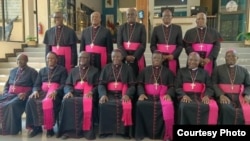In Zambia, Catholic bishops raised the alarm this week about increased arrests and prolonged detentions of opposition leaders.
In a letter signed by all 11 of the country’s Catholic bishops, they lamented what they called significant restrictions on democratic freedom, illustrated by charges being brought against at least six opposition leaders, as well as journalists and civil society activists, for political activities.
The Zambia Conference of Catholic Bishops, the church’s national leadership body, released a pastoral letter Sunday. It said the church is alarmed by gross violations of human rights and undemocratic tendencies by the Zambian government.
The group’s president, Kasama Archbishop Ignatius Chama, said, “Even more alarming is the disturbing trend by the police of keeping suspects in detention for a period more than prescribed by the law.”
Hate speech penalties
Chama urged authorities to withdraw a penal code amendment bill being considered by parliament to allow for further consultations. According to the National Assembly website, the bill is aimed at increasing penalties for hate speech.
Introducing the bill in June, President Hakainde Hichilema said certain sections of society were promoting hate speech against some tribes, which he said could cause civil strife. He said the proposed law would help ensure that perpetrators were given stiffer punishments and deter others.
However, the bishops said the proposals would undermine fundamental freedoms needed to ensure democracy.
Jackson Silavwe, a spokesperson for the United Kwacha Alliance, a network of 10 opposition political parties, told VOA that the Catholic Church has shown commitment to being the voice of the voiceless in Zambia.
“We commend the ZCCB for its courageous and principled stance in addressing these critical issues, which resonate with the cries of many Zambians yearning for justice, equity and peace in our nation,” Silavwe said.
Government response
Zambia‘s chief government spokesperson, Cornelius Mweetwa, told journalists Tuesday that the government is studying the contents of the letter.
“The church are all-weather partners of government, and where they raise issues of concern, we shall not be in a hurry to respond to them,” Mweetwa said. “We would like to internalize and be able to consult widely.”
University of Zambia lecturer and political scientist Boniface Cheembe emphasized the need for the church and government to strengthen dialogue and address issues of mutual interest.
In August 2024, senior United Nations human rights officials issued a report that concluded the restrictions and arrests of political opponents in Zambia has had a chilling effect on freedom of opinion, association and assembly in the country and has stunted the building of democratic institutions.




